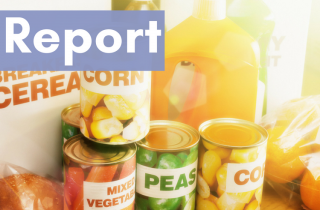Ban on BPA in Food and Beverage Containers Introduced in the 114th Congress
Sen. Markey and Rep. Meng Seek to Strengthen FDA Ability to Ensure Safe Food Packaging with the Introduction of the Ban Poisonous Additives Act of 2016
FOR IMMEDIATE RELEASE
SEPTEMBER 28, 2016
CONTACT:
Erika Wilhelm, Breast Cancer Prevention Partners
Bisphenol A (BPA), the notorious chemical banished from baby bottles and infant formula due to concerns about its impact on the health of young children, is now the target of federal legislation that would ban BPA from food and beverage containers and require the FDA to review the safety of other potentially toxic chemicals used in food packaging. Today, the “Ban Poisonous Additives (BPA) Act of 2016” was introduced into both chambers of Congress by Sen. Ed Markey, D-Mass and Rep. Grace Meng, D-N.Y. Both members of Congress are longtime champions of this important public health, worker health and environmental health issue. If passed, the bill will empower the U.S. Food and Drug Administration (FDA) to remove BPA from food packaging, label food packaging that still contains BPA while alternatives are developed, encourage manufacturers to replace this hazardous chemical with alternatives that are safer for workers and consumers, and require the agency to review the safety of all food contact substances.
“Doctors, researchers and parents all know that BPA is toxic for our bodies, especially for vulnerable groups such as infants and young children and workers,” said Sen. Edward Markey, D-Massachusetts. “It’s time to take the concern out of canned goods by taking the BPA out of food and beverage containers. The Ban Poisonous Additives Act will help ensure that our factories and our entire food supply are free from this damaging chemical. I thank Rep. Meng for her partnership on this legislation and for standing up to say that it’s time to ban BPA and move to safer alternatives.”
“Most people in the United States are exposed to bisphenol A every day, primarily from the food they eat despite well-known risks to human health,” said Janet Nudelman, Director of Program and Policy at the Breast Cancer Fund. “The Breast Cancer Fund supports the “BPA Act of 2016” because it authorizes the FDA to remove BPA from food cans, something it has already done for baby bottles and sippy cups, and also directs the agency to review the safety of thousands of other potentially dangerous chemicals used in food packaging,” said Nudelman.
“Banning BPA from food and beverage containers is common sense,” said U.S. Rep. Grace Meng, D-Queens. “As a founder and Co-Chair of the Kids Safety Caucus, it has been a priority of mine to help keep children out of harm’s way, and this bill would ensure that kids and families are not exposed to such a dangerous and toxic substance. It would also better protect factory workers who manufacture products that contain this hazardous chemical. I respectfully call on my colleagues in the House and Senate to pass this important legislation, and I thank Senator Markey for partnering with me on this critical effort.”
BPA is an endocrine-disrupting chemical that negatively impacts our hormonal systems. More than 300 animal and human studies suggest it may contribute to a host of harmful health effects including breast and prostate cancer, infertility, type-2 diabetes, obesity, asthma and attention deficit disorder. Other studies have demonstrated the capacity of BPA to migrate from can linings into the food, where it is consumed, raising concerns about exposures to low, but biologically relevant, levels of BPA. Equally troubling is the fact that BPA is still being widely used to line food cans, despite manufacturers’ promises to the contrary. A 2016 report issued by the Breast Cancer Fund found that, despite consumer demand for BPA-free cans, 67 percent (129 of 192) of the 200 cans they tested contained BPA-based epoxy in the body and/or the lid. A 2013 Breast Cancer Fund comprehensive review of the science linking BPA to later life health problems was also deeply troubling; finding prenatal exposure to the chemical is of even greater concern than childhood exposure.
Young women workers in plastics and canning facilities faced a five fold increase in breast cancer risk, likely linked to prolonged exposure to cancer-causing and endocrine-disrupting chemicals, such as BPA, according to a 2012 study published in the journal “Environmental Health.”
“Minuscule amounts of BPA – measured at parts per billion, or even parts per trillion – have been shown to cross the placenta and disrupt normal prenatal development, which can set the stage for later-life diseases, such as breast cancer and prostate cancer,” said Nudelman.
“By reducing exposure to BPA, this bill can play a significant role in protecting future generations from an increased risk of breast cancer,” said Nudelman.
A peer-reviewed study published in Environmental Health Perspectives (2011) suggests that food packaging is a substantial source of exposure to BPA. Scientists at the Breast Cancer Fund and Silent Spring Institute discovered an average drop of 60 percent in BPA levels when study participants ate a diet that avoided contact with BPA-containing food packaging, such as canned food and polycarbonate plastic. The study suggests that removing BPA from food packaging will remove the number one source of BPA exposure.
Efforts to ban or restrict BPA in the United States and Canada have been ongoing since 2005. In a stunning example of the power of consumer demand to move a $77 billion market, five U.S. cities and counties, and 13 states banned BPA from baby bottles, infant formula cans and sports water bottles. International regulation of BPA in food packaging has been equally aggressive. France banned the use of BPA in all food containers as of 2015.
“The continued presence of BPA — and potentially unsafe alternatives — in the lining of canned foods has resulted in ongoing hazardous exposures to workers, low-income populations, pregnant women, children and other vulnerable populations,” said Nudelman, “We applaud Senator Markey and Representative Meng for their leadership on this important public health issue and urge Congress to pass the Ban Poisonous Additives Act of 2016.
###
Breast Cancer Prevention Partners (BCPP) is the leading national science-based policy and advocacy organization working to prevent breast cancer by eliminating our exposure to toxic chemicals and radiation.
Types: Press Release



